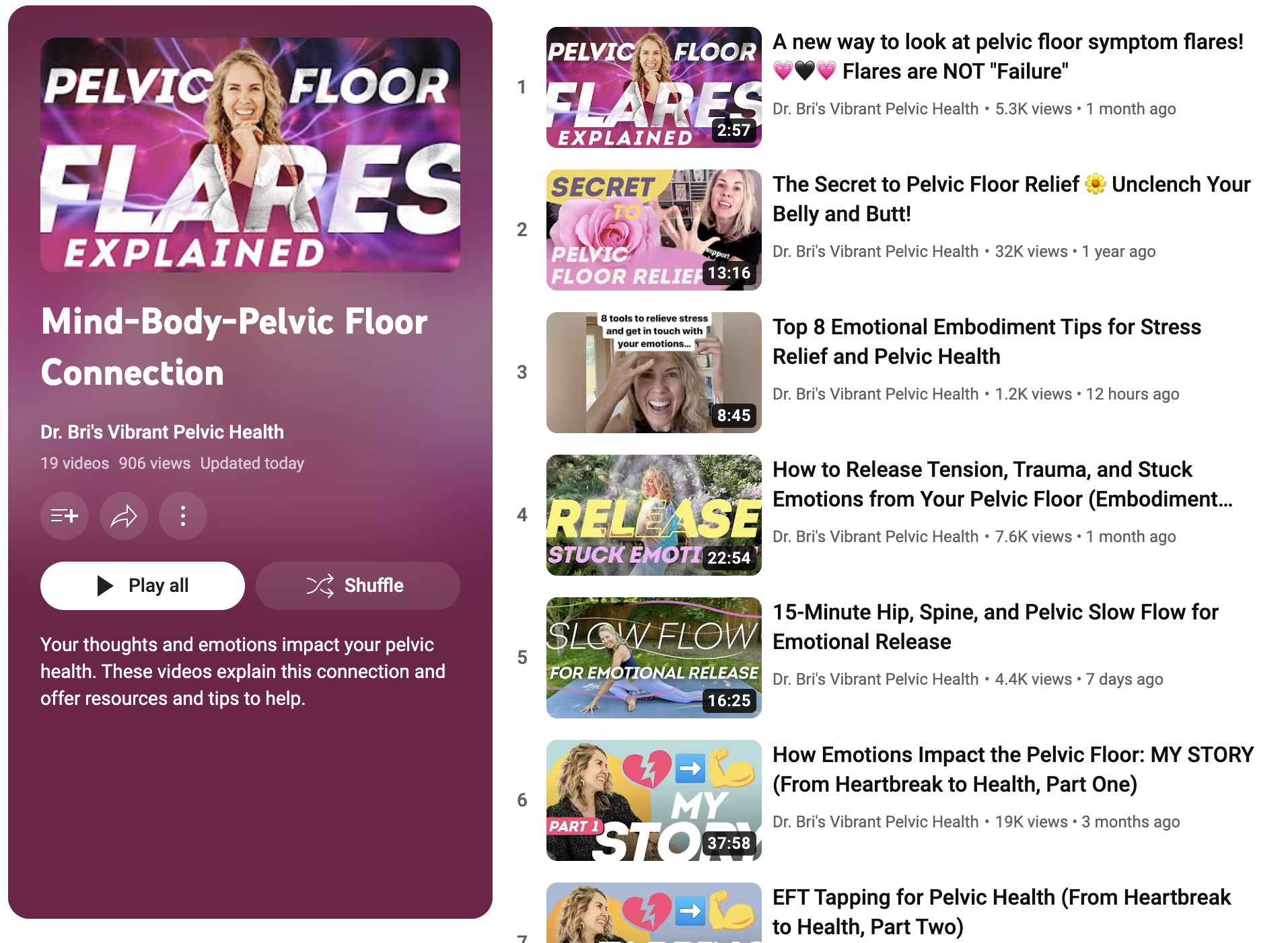Stress and Pelvic Tension Tips

Recently, I asked the following question to my followers on Instagram, "Have you noticed the connection between stress and pelvic tension in your body?"
>>> 92% said YES. <<<
I asked the same question to my followers on YouTube, and 87% said that yes, they have noticed the stress-pelvic tension connection.
We're waking up!
We're waking up to the power of our minds and emotions when it comes to the tension and tightness we hold in our bodies!
This is very different from the old paradigm, that taught, "if your pelvic floor is having problems, then you need to do some Kegel exercises to fix it."
The stress-pelvic tension connection PROVES that there's more to pelvic health issues than a mechanical (musculoskeletal) imbalance alone!

Why Stress Creates Pelvic Tension
Stress is a natural human response that prompts us to address changes, challenges, and threats in our lives. Stressors can be micro-stressors (teeny tiny things that you might not even notice, like the dog that's constantly barking in your neighbor's yard) or macro-stressors such as a divorce or bankruptcy. Stressors are often lumped into categories of "good stress" (such as moving into a new home, or starting a new job) and "bad stress" (such as the loss of a loved one).
ALL TYPES of stressors — micro and macro stressors, and so-called "good" and "bad" stressors — cause our bodies to respond.
Mental and emotional stress creates a cascade of effects in our body that can range from increased heart rate to changes in your breathing, to changes in muscular tension. Interestingly, the pelvic floor is one of the first and fastest muscle groups in our body that responds to stress by TENSING UP. The pelvic floor is the base of our core "powerhouse," and by tensing up, it's preparing us to fight, flee, or freeze... even if it's tensing on a super-subtle level that we aren't even aware of.
Why Stress Creates Pelvic Floor Issues
Stressors aren't bad... they're a part of life! The problem is when stress becomes CHRONIC. This is when health conditions can develop.
Most people know that chronic, unmanaged stress can contribute to heart conditions such as heart attacks. But did you know that chronic, unmanaged stress can contribute to PELVIC HEALTH conditions too?
For example, consider the impact of stress on prolapse. Chronic mental pressure and stress can cause you to rush through your life, not paying attention to how you move your body and how you're treating your pelvic floor.
While stress itself may not directly cause your organ(s) to prolapse, it can intensify symptoms and can prevent you from getting better. Why? Because chronic stress contributes to:
- Lack of energy and motivation and/or insomnia. This inhibits the desire to exercise, contributing to total-body weakness (including your pelvic floor muscles).
- A compromised immune system. This increases your risk for illness and can contribute to frequent bouts of coughing and nose-blowing (which creates downward pressure on the pelvic organs and pelvic floor).
- Poor posture, which increases the risk of prolapse.
- Poor digestion, which can lead to constipation and chronic straining to poo.
- A rushed lifestyle that causes you to push to pee in order to "get it out faster."
- Tense/tight pelvic floor muscles (as described above).
Tense/tight pelvic floor muscles can squeeze around and/or pull on the prolapsed organs. This makes the prolapse discomfort more severe and keeps you stuck in patterns of poor posture, alignment, and body mechanics.
Fascinating, isn't it??? It's all connected!
Embodiment Work to Manage Stress
I've been learning and personally using 8 embodiment tools to help me release stress and pressure, and healthfully express my emotions rather than keeping them bottled up and "frozen" inside, which was my Modus Operandi for many years.
In the following quick video, I share these tools with you!
Mental + emotional health and PELVIC HEALTH go hand-in-hand.
Watch, practice, and save the tips in this 8-minute video for the next time you’re feeling stressed, stuck, worried, anxious, spun out, and TENSE in your pelvic floor.
Questions about Stress and Pelvic Tension
Question: "Aren't tight muscles GOOD for pelvic health? I thought my urine leakage was due to loose pelvic muscles and that I should tighten them up with Kegels!"
Answer: >> Loose/lax/weak muscles don't work very well, but tight/tense muscles don't work well either! Tight/tense muscles are NOT strong and coordinated... they're just tight. Tight muscles will tense up even more if you do a bunch of Kegels just because you think you "should." Unfortunately, this can cause pelvic floor issues such as incontinence to WORSEN. I have another blog post dedicated to this concept here.
Question: "If I stress about something and have lots of time to think about how stressed I am, then I tense up significantly. But when I'm stressed because there is a lot to do (at work for example) and I'm not getting any rest, then I actually feel the tension less. Why don't I feel the stress-tension connection when I'm busy?"
Answer: >> Often, stress will make us "numb out," especially when we're in sympathetic "go mode" (also known as fight, flight, freeze, or fawn). When we're super busy and in this highly charged state of nervous system arousal, we don't have the TIME or BANDWIDTH to feel any sensations in our body (i.e. pain, tightness, discomfort, etc.). Basically, your body is distracted and can't feel the tension that's building up inside! However, there's often a *rebound effect* where you notice the sensations AFTER the stressful period of time pressure and/or work pressure has dissipated. This can lead to huge swings in symptoms and sensations in your body, and feeling like you've "crashed" after a period of feeling pretty good. It's not something to be scared of, it's just something to get curious about the next time you're in this situation.
Interestingly, you can use distraction to your advantage when you want to take your mind off of your pelvic floor symptoms! Just know that positive distraction (due to having fun and going out and enjoying life) is very different from stressed/anxious distraction that MASKS an underlying tension response in your body that's occurring beneath the surface when you're constantly stressed and on edge.
Question: "I have not noticed the connection between stress and pelvic floor tension. Is something wrong with me?"
Answer: >> Everyone is different, so it's possible that your body might handle/manage stress differently. However, you might want to do some self-investigation. It's possible that you simply haven't noticed or "tuned in" to this connection between your mind and your body! The next time you’re feeling stressed, overwhelmed, anxious, scared, uncertain, indecisive, overworked, etc., check in with yourself. See if you notice any of the following:
- You’re not breathing properly (usually people will notice shallow breathing or breath-holding when they're stressed, which creates a lack of diaphragmatic movement and locks up your pelvic floor as well)
- Your ribs, belly, and/or butt muscles feel tense
- Your anus and/or genitals feel numb/tight/tense
- Your pelvic floor symptoms feel worse (i.e. prolapse symptoms feel worse, urinary leakage is worse, urinary urgency or frequency is worse)
Just get curious!!! There could be some interesting self-awareness for you to gain, and you might realize that YES, in fact, your body does hold pelvic tension when you're stressed!
Mind-Body-Pelvic Health Playlist
If you'd like a complete playlist with videos that showcase the mind-body-pelvic health connection, go here:
I hope this blog post helped you understand the connection between stress and pelvic tension a little bit better!
As always, remember: for vibrant health, eat clean, move EVERY DAY, love yourself fully-madly-deeply... and you *will* shine brighter.
Does your pelvic floor need help?
Many women think they just need live with the changes they’re experiencing
“down there,” but this is NOT the case. Take the short quiz to find out if you have issues that can be solved naturally.








